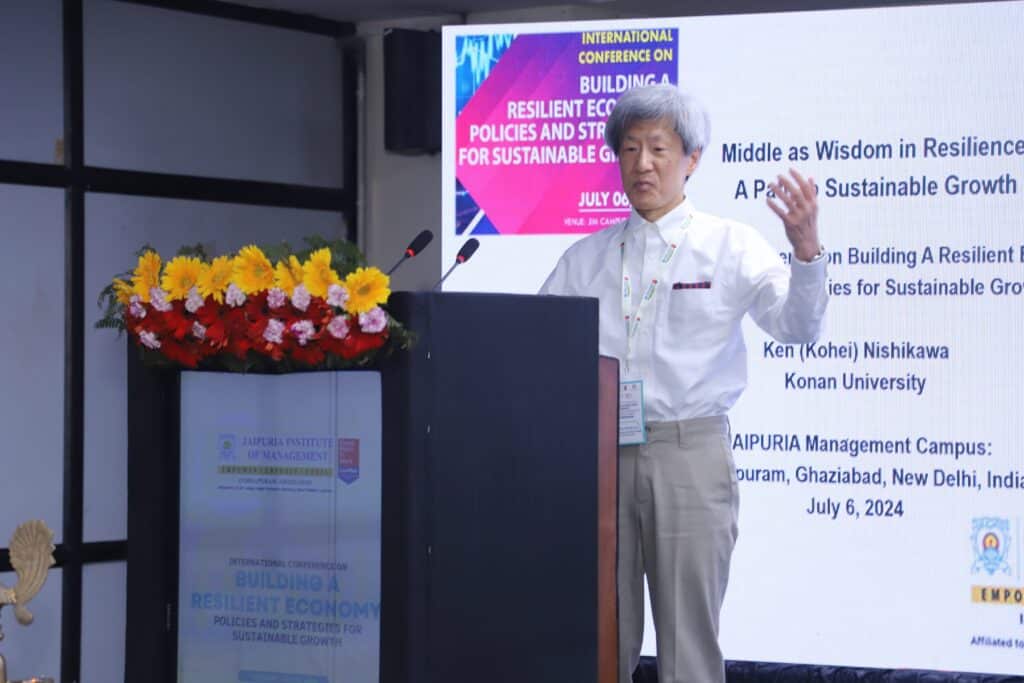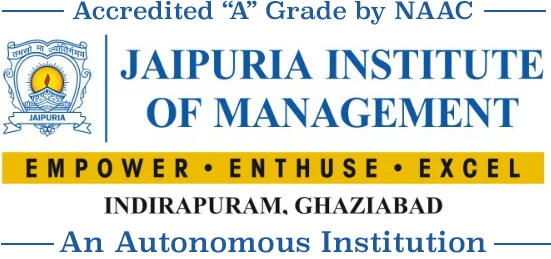
The International Conference on Building a Resilient Economy: Policies and Strategies for Sustainable Growth, held at the Jaipuria Institute of Management, Ghaziabad, was graced by numerous thought leaders and experts. Among them, Prof. Ken Nishikawa from Konan University, Japan, delivered a profound keynote address that captivated the audience with its depth and relevance.
Prof. Nishikawa’s address focused on the concept of resilience through the lens of the “Middle Path,” drawing from philosophical, cultural, and economic perspectives. His thought-provoking ideas provided a fresh outlook on achieving sustainable growth and resilience in a rapidly changing world.
Key Points from Prof. Ken Nishikawa’s Keynote Address:
- The Middle Path: Prof. Nishikawa introduced the concept of the “Middle Path,” emphasizing its importance in creating a balanced and resilient society. He explained that the Middle Path is about finding equilibrium between extremes and adopting a moderate, yet proactive, approach to challenges.
- Philosophical Foundations: Drawing from various philosophical traditions, Prof. Nishikawa highlighted how moderation and balance have been central to human thought across cultures. He cited examples from Western and Eastern philosophies, including Aristotle’s Golden Mean and Confucianism’s doctrine of the Mean.
- Technological and Social Advancements: Prof. Nishikawa discussed the role of technology in modern society and its impact on resilience. He pointed out that while technological advancements bring efficiency and innovation, they also require ethical considerations and responsible usage to ensure they contribute positively to society.
- Humanist Management and Leadership: Emphasizing the importance of human-centric approaches, Prof. Nishikawa advocated for humanist management and leadership. He argued that understanding human behavior and fostering a culture of empathy and collaboration are essential for building resilient organizations and communities.
- The Role of Social Identity: Prof. Nishikawa explored the concept of social identity and its influence on resilience. He suggested that embracing diverse identities and fostering inclusivity can strengthen social bonds and enhance collective resilience.
- Learning from Nature: Using the example of the resilient Junco tree in Hiroshima, which survived the atomic bomb and natural disasters, Prof. Nishikawa illustrated how nature demonstrates resilience. He encouraged the audience to draw inspiration from nature’s ability to adapt and thrive amidst adversity.
- Middle Class as a Stabilizing Force: He highlighted the importance of a strong middle class in ensuring societal stability and resilience. Prof. Nishikawa argued that a vibrant middle class can bridge gaps, promote social mobility, and contribute to sustainable economic growth.
- Community and Democracy: Prof. Nishikawa underscored the role of small communities and democratic practices in building resilience. He advocated for grassroots initiatives and participatory governance as means to create resilient and empowered societies.
Prof. Ken Nishikawa’s keynote address at the International Conference on Building a Resilient Economy provided a comprehensive and nuanced perspective on resilience. His emphasis on the Middle Path, humanist management, and the importance of community and inclusivity resonated deeply with the audience, offering valuable insights for fostering sustainable growth.
Stay tuned for more highlights from the International Conference on Building a Resilient Economy, including insights from other distinguished speakers.
Watch the Full Keynote Address by Prof. Ken Nishikawa:




